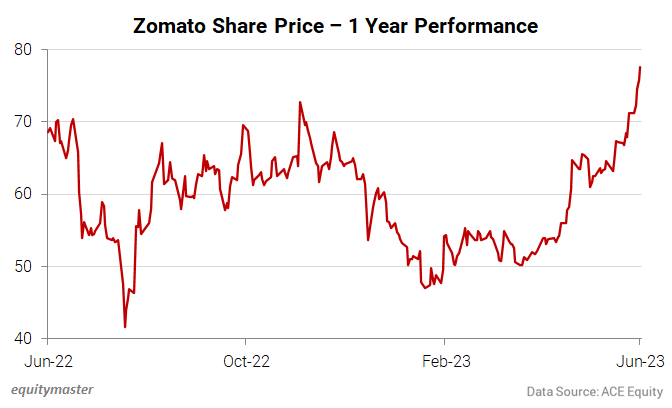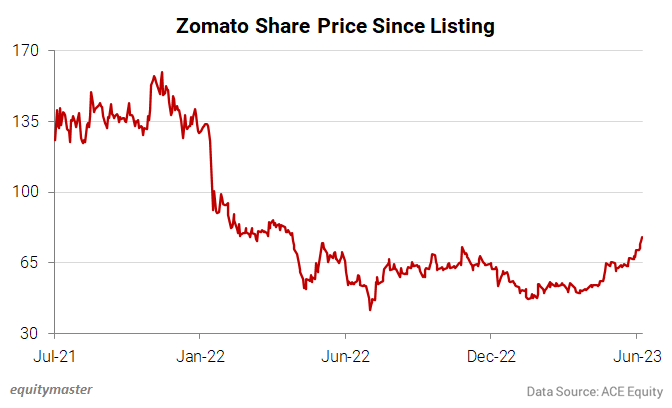- Home
- Views On News
- Jun 10, 2023 - Zomato Finds Itself in an Enviable Position as Stock Surpasses IPO Price. What Next?
Zomato Finds Itself in an Enviable Position as Stock Surpasses IPO Price. What Next?

These days, it's not rare to come across a newspaper headline commenting on a tech company's layoffs and incoming financial problems.
Back in 2020, when sectors such as travel and hospitality came to a standstill, the tech industry forced employees to work from home without causing any disruption.
The optimism surrounding hiring was at an all-time high. And that's the reason experts predicted the technology sector would be unaffected by the recession.
But now with tech companies leading the charge when it comes to layoffs, the new data is surely suggesting that previous assumptions were inaccurate.
Nonetheless, some tech stocks are performing well and making the most of this bullish market environment.
Take the stock of Facebook for example. While Meta Platforms has announced massive layoffs, the stock is up over 50% in the past one year and over 110% in 2023 so far.
If we take an Indian company's example, share price of Zomato has rallied hard off the bottom of Rs 40 per share price.
The stock is now retesting its IPO price of Rs 76 per share.

Let's find out what's behind the sudden optimism and what lies ahead for the tech company.
Why Zomato share price is rising
#1 Narrowing losses
Last month on 19 May 2023, Zomato reported its quarterly results where it turned EBITDA positive at Rs 280 million (m).
The company is now hoping to achieve net profit on a consolidated basis in the next four quarters.
In the March 2023 quarter under review, Zomato narrowed its losses to Rs 1.9 billion (bn) from Rs 3.6 bn a year ago, and Rs 3.5 bn a quarter ago.
This was on the back of a 70% increase in revenue to Rs 20.6 bn, helped by growth in its B2B supplies business, Hyperpure.
With the cash burn reducing every quarter due to improvement in financial performance, things are looking way better than estimated.
#2 Change in management
Last month, Zomato had rejigged its top management.
Rakesh Ranjan, who previously led Hyperpure, took over as the CEO of Zomato. He has played multiple roles in Zomato over the last six years, including as Global Business Head in charge of Zomato Gold, and as its Chief Sales Officer.
Meanwhile, the company appointed Rishi Arora as the CEO of Hyperpure. He was one of ?Blinkit?'s early executives who was elevated to the role of co-founder last year.
In a filing to exchanges, the company said,
- We believe that a change of leadership every now and then with capable people at the helm brings new perspectives to the business enabling it to evolve faster. Such leadership changes are also great for people development, and we are confident that our people strategy will set us up for success even decades from now.
In January 2023, a series of top-level exits at Zomato had the restaurant ecosystem worried. Its co-founder and chief technology officer, Gunjan Patidar, resigned in January 2023.
In November 2022, it saw the exit of another co-founder, Mohit Gupta, besides the head of new initiatives Rahul Ganjoo and vice president, global growth Siddharth Jhawar.
#3 Revision in discounts at ONDC
The other reason why Zomato share price is rising is due to speculative reports stating there will be revision of discounts at the Open Network for Digital Commerce (ONDC).
According to reports, ONDC had revised its incentive scheme for network participants to reduce the dependency on discounts for adoption.
Under the new regime, the maximum pricing incentive will be capped at Rs 100 per order, which was Rs 120 per order earlier. Also, the total incentive will not exceed 50% of the total order value, including the shipping charges.
Last month, investors became wary amid fears of the food-tech sector being disrupted by a new entrant - ONDC.
At present, Zomato and Swiggy are two of India's leading food delivery platforms that capture the lion's share. But the competition has intensified following ONDC's launch, which allows customers to order food and groceries without the need of a third-party app like Zomato and Swiggy.
What next?
The fundamentals of the company have been improving. It's not all bad for the stock.
Also, in the near term, the impact of ONDC is unlikely to be significant on Swiggy and Zomato. The ONDC network is still small. But as ONDC scales up, there will be some impact.
Most people who are using ONDC now are doing so because of the discounts. And these discounts only exist because the network is small. Once ONDC scales up and becomes sustainable, the discounts are likely to vanish.
Zomato has a sizeable market share with the top two players (Zomato and Swiggy) dominating the segment. Though Amazon and others have planned to enter this space, it will take some time before they reach the higher level and compete with Zomato and Swiggy.
Another growth prospect for Zomato is it operates in a largely untapped market.
However, Zomato still remains a loss-making entity at the net profit level. Given the quantum of ESOP costs, and an increasingly competitive market, we think the road to profitability still remains long and unclear.
To know more, watch the below video by Aditya Vora where he decodes what investors and traders should do with the stock of Zomato.
How Zomato share price has performed recently
In the past one year, Zomato share price has gained 13%. In 2023 so far, the stock is up 30%.
In the past five days, the stock has rallied around 10%. It's now trading above the IPO price of Rs 76.
Zomato hit the market at a listing price of Rs 115 on 23 July 2021 against its issue price. It closed with a listing day gain of 65.6% at Rs 125.85.
The company is still 52.5% below its all-time high price of Rs 159.75 touched in November 2021.

Have a look at the table below to compare it with other tech companies.
Comparative Analysis
| Company | Zomato | Nykaa | IndiaMart |
|---|---|---|---|
| ROE (%) | -4.9 | 1.8 | 14.6 |
| ROCE (%) | -5.0 | 8.2 | 19.3 |
| Latest EPS (Rs) | -1.1 | 0.1 | 92.7 |
| TTM PE (x) | 0.0 | 0.0 | 60.3 |
| TTM Price to book (x) | 3.4 | 28.7 | 8.4 |
| Dividend yield (%) | 0.0 | 0.0 | 0.4 |
| Industry PE | 0.0 | ||
| Industry PB | 5.4 | ||
About Zomato
Zomato was incorporated in the year 2010. The company, during its initial stages, started off as a restaurant finder.
Following in the footsteps of its competitor, Swiggy, the company formally launched its food delivery service in India in the year 2015.
By 2020, Zomato expanded its food delivery business to over 500 cities, facing stiff competition from both Swiggy and Uber Eats.
However, during the same year, the company acquired Uber Eats to consolidate its position in the food delivery space.
For more details, check out Zomato company fact sheet and quarterly results.
Safe Stocks to Ride India's Lithium Megatrend
Lithium is the new oil. It is the key component of electric batteries.
There is a huge demand for electric batteries coming from the EV industry, large data centres, telecom companies, railways, power grid companies, and many other places.
So, in the coming years and decades, we could possibly see a sharp rally in the stocks of electric battery making companies.
If you're an investor, then you simply cannot ignore this opportunity.
Details of our SEBI Research Analyst registration are mentioned on our website - www.equitymaster.comDisclaimer: This article is for information purposes only. It is not a stock recommendation and should not be treated as such. Learn more about our recommendation services here...

Yash Vora is a financial writer with the Microcap Millionaires team at Equitymaster. He has followed the stock markets right from his early college days. So, Yash has a keen eye for the big market movers. His clear and crisp writeups offer sharp insights on market moving stocks, fund flows, economic data and IPOs. When not looking at stocks, Yash loves a game of table tennis or chess.
FAQs
Which are the top growth stocks in India right now?
As per Equitymaster's Stock Screener, these are the top growth stocks in India right now.
- #1 ZOMATO
- #2 ADANI GREEN ENERGY
- #3 L&T INFOTECH
- #4 INDUS TOWERS
- #5 TRENT
These companies have been ranked as per their 5-year sales compounded annual growth rate (CAGR)
High growth companies have the potential to generate multibagger returns. But if these companies disappoint even slightly, they could get punished heavily by the market due to high valuations.
However, there are other parameters you should take into account as well before forming a hard opinion on the stock.
What are growth stocks?
Growth stocks are companies whose sales and profits are growing at a faster pace than the market.
The top growth stocks usually trade at a premium to other stocks in the market because investors are willing to pay for the higher profits in the years ahead.
The faster they grow, the bigger the returns are for shareholders.
What are the risks of investing in growth stocks?
It's important to understand that growth stocks have a lot of investor expectations driving them higher. This is why they trade at high PE ratios. In fact, they are the most expensive stocks in the market.
If these expectations are dashed due to poor quarterly results or some unexpected event, then growth stocks will crash.
There's also the risk of higher interest rates. If interest rates rise, it puts breaks on growth stocks and their plans.
Investors who have a low risk-appetite may want to reconsider pursuing a growth-oriented investing strategy.
Which is better - value stocks or growth stocks?
There is no clear winner as both focus on different investing strategies. It is up to investors to identify their investing goals and choose accordingly.
Growth stocks are more volatile than value stocks but have the potential to rise in price substantially. On the other hand, value stocks are low-risk, and offer regular dividends but can't fulfill short-term investing goals.


Equitymaster requests your view! Post a comment on "Zomato Finds Itself in an Enviable Position as Stock Surpasses IPO Price. What Next?". Click here!
Comments are moderated by Equitymaster, in accordance with the Terms of Use, and may not appear
on this article until they have been reviewed and deemed appropriate for posting.
In the meantime, you may want to share this article with your friends!